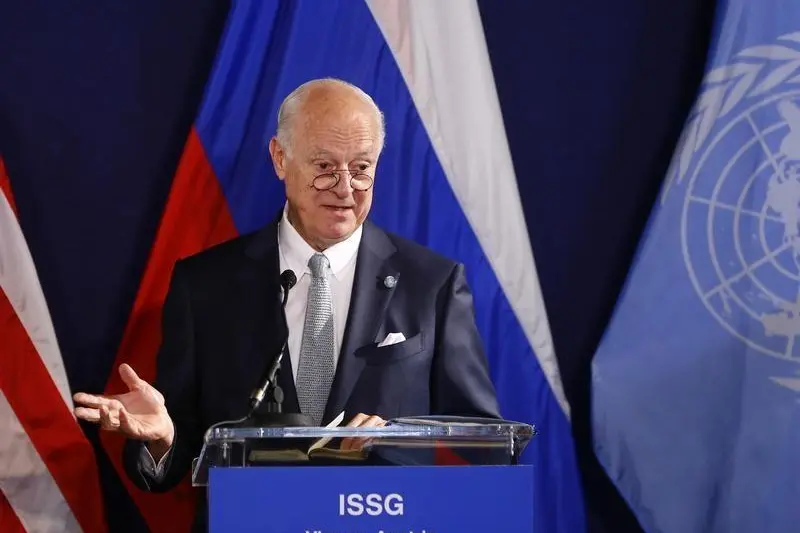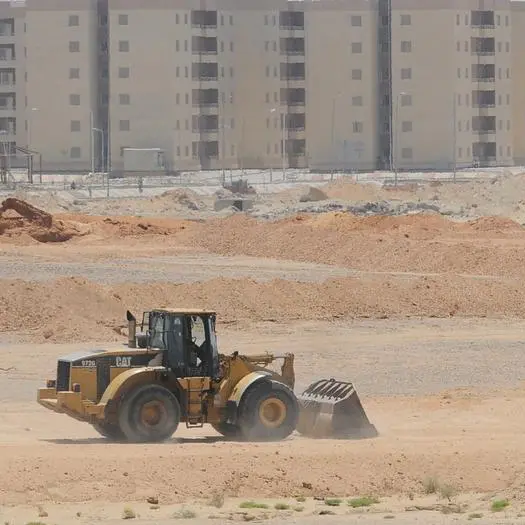PHOTO
(adds details, quotes)
GENEVA, May 19 (Reuters) - United Nations Syria envoy Staffan de Mistura vowed on Thursday to take the "last resort" option of air drops of humanitarian aid if land access to besieged areas in Syria is not improved by June 1.
Without improved aid access and some restoration of Syria's tattered cessation of hostilities, the credibility of the next round of peace talks would be in question, he said.
The damage to the peace talks prompted the United States and Russia to convene the International Syria Support Group of major and regional powers on Tuesday, which toughened the truce terms and endorsed a stronger push for humanitarian aid.
"We want to bring aid to everyone. If the food cannot be brought by convoys, the alternative is air drops," de Mistura told journalists in Geneva.
Air drops were "the most expensive, the most complicated, the most dangerous option", he added. "So the air drops are the last resort, but we are getting close to it."
The U.N.'s World Food Programme (WFP) has made more than 30 air drops of food and other supplies to the eastern town of Deir al-Zor, besieged by Islamic State, due to a total lack of access, but that is the only location so far.
De Mistura said he would not abandon the peace talks, but was waiting for the right date.
"Obviously we are in a clear hurry to start reintroducing the next round of the intra-Syrian talks," he said. But if humanitarian access to besieged areas did not improve, "then the credibility of the next round of talks would be in question".
He said he would not rule out overriding any Syrian government objections to air drops.
Observance of Syria's cessation of hostilities arrangement had gone down "from 80-85 (percent) to 50 (percent)," he said.
De Mistura's humanitarian advisor Jan Egeland said a clear intention to organise air drops for Syria's remaining besieged areas would help convince President Bashar al-Assad to allow humanitarian convoys to go in by road.
"We do believe that the option of air drops will actually make it possible for us to go by land in the next weeks," he said.
Egeland said aid had reached 13 of 18 besieged areas after a convoy got into the Harasta suburb of Damascus on Wednesday. But another convoy was turned back from Daraya town last week because what he called "well-fed" soldiers barred it from delivering baby milk powder.
Humanitarian supplies this month have not reached half the 900,000 people the U.N. wanted to supply in besieged and hard-to-reach areas, he said. The target for June is 1.1 million.
(Reporting by Tom Miles and Stephanie Nebehay; Editing by Tom Heneghan) ((tom.miles@thomsonreuters.com; +41 22 733 38 31; Reuters Messaging: tom.miles.reuters.com@reuters.net))
GENEVA, May 19 (Reuters) - United Nations Syria envoy Staffan de Mistura vowed on Thursday to take the "last resort" option of air drops of humanitarian aid if land access to besieged areas in Syria is not improved by June 1.
Without improved aid access and some restoration of Syria's tattered cessation of hostilities, the credibility of the next round of peace talks would be in question, he said.
The damage to the peace talks prompted the United States and Russia to convene the International Syria Support Group of major and regional powers on Tuesday, which toughened the truce terms and endorsed a stronger push for humanitarian aid.
"We want to bring aid to everyone. If the food cannot be brought by convoys, the alternative is air drops," de Mistura told journalists in Geneva.
Air drops were "the most expensive, the most complicated, the most dangerous option", he added. "So the air drops are the last resort, but we are getting close to it."
The U.N.'s World Food Programme (WFP) has made more than 30 air drops of food and other supplies to the eastern town of Deir al-Zor, besieged by Islamic State, due to a total lack of access, but that is the only location so far.
De Mistura said he would not abandon the peace talks, but was waiting for the right date.
"Obviously we are in a clear hurry to start reintroducing the next round of the intra-Syrian talks," he said. But if humanitarian access to besieged areas did not improve, "then the credibility of the next round of talks would be in question".
He said he would not rule out overriding any Syrian government objections to air drops.
Observance of Syria's cessation of hostilities arrangement had gone down "from 80-85 (percent) to 50 (percent)," he said.
De Mistura's humanitarian advisor Jan Egeland said a clear intention to organise air drops for Syria's remaining besieged areas would help convince President Bashar al-Assad to allow humanitarian convoys to go in by road.
"We do believe that the option of air drops will actually make it possible for us to go by land in the next weeks," he said.
Egeland said aid had reached 13 of 18 besieged areas after a convoy got into the Harasta suburb of Damascus on Wednesday. But another convoy was turned back from Daraya town last week because what he called "well-fed" soldiers barred it from delivering baby milk powder.
Humanitarian supplies this month have not reached half the 900,000 people the U.N. wanted to supply in besieged and hard-to-reach areas, he said. The target for June is 1.1 million.
(Reporting by Tom Miles and Stephanie Nebehay; Editing by Tom Heneghan) ((tom.miles@thomsonreuters.com; +41 22 733 38 31; Reuters Messaging: tom.miles.reuters.com@reuters.net))





















